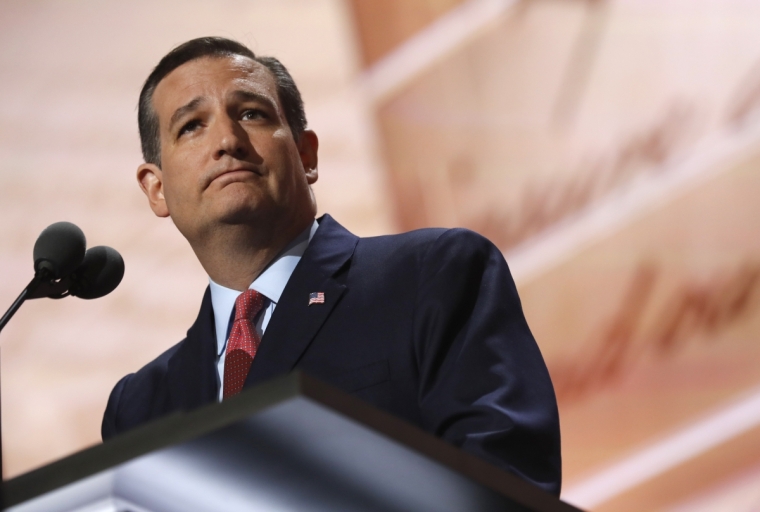COMMENTARY: In refusing to endorse Trump, Cruz had higher laws in mind

FORT WORTH, Texas (Christian Examiner) – The ancient builders who gave human civilization its wonders knew a great deal about engineering grand projects, from the pyramids of Giza to the aqueducts that carried water over – and in some cases through – mountains to Rome and other parts of the empire.
They knew that angle, incline and curvature are all best judged from a distant perspective.
This architectural truth has since been appropriated in every realm of life from personal relationships, to legal precedent, and to politics.
Perspective (the passage of time) provides distance to think, analyze, and evaluate actions in a way that seems much more judicious than the knee-jerk quips and vacuous exchanges characteristic of modern news rooms and Monday-morning quarterback talk shows.
Unfortunately, we live in a world where seldom is deep thought given to a matter before the mouths of pundits begin their operations.
It has been a week since former Republican presidential candidate Sen. Ted Cruz delivered what Charles Krauthammer called "the longest suicide note in American political history" – a speech at the Republican National Convention most have called a career ending tirade from an unashamed narcissist and liar.
Gov. Mike Huckabee, whom I know and have interviewed on several occasions, opined that Cruz "dishonored himself and the convention" for refusing to unabashedly endorse Trump. He expressed his disgust with "Lyin' Ted" refusing to "land the plane" and submit peacefully to the Trump cult of personality.
FOX News commentator Todd Starnes, another friend and colleague with whom I normally agree, said Cruz "broke his word" and that made him "worse than a loud-mouthed blockhead" (presumably Trump himself, whom Starnes has said is a political shape-shifter).
Worse were Trump's trumpets claiming Cruz was "not a Christian" for failing to follow through on his pledge to endorse the Republican nominee – a pledge the nominee himself said in March he would not honor if he was not "treated fairly" (read, "if I do not win").
The charge of un-Christian behavior on the part of Cruz, together with the near messianic devotion some evangelical leaders have shown for Trump, referring to him as a King David or Cyrus the Great, has presented for America and the world a confusing picture of what a leader – and a leader who is a Christian – is.
And that is what is so surprising about the reaction to Cruz's speech by men such as Franklin Graham and Huckabee (who began his adult life as a Baptist minister) when they point to the one-time candidate "not keeping his word."
In discussions about the events which transpired at the Republican National Convention last week, I have listened to many such discourses about Trump, Cruz and his now infamous speech. I have responded to each with a few questions. First among them is this:
"Which is more important to keep: a political pledge which multiple candidates waved off early in the primary season, or a solemn vow to the wife of your youth?"
The second is like unto the first:
"Which is more important to keep: the commandment to honor your father, or the pledge to support a candidate who has made it his personal mission to destroy what you love?"
Within moments of asking both questions, if I listen closely enough, the sound of crickets chirping becomes a little clearer to the listening ear. There is no justifiable response to either question for endorsing Donald Trump – not "well, this is politics," not "well, he should have done it anyway," and not "well, it was the right thing to do."
There was a time in America when insults like Trump hurled at Cruz's wife and father would have been settled at high noon on Main St. This is not that time, but the same principles of being honor-bound to a higher law and the principle obligations of Scripture on the believer are in play.
Christian virtue demanded that Cruz uphold his vow to protect his wife and honor his father over and above any political loyalty to Trump.
To a certitude, there will be many who argue that Cruz did not have to appear at the convention. He did not have to give a lengthy policy speech and then fail to endorse Trump.
That is correct. He did not have to appear and speak.
It is clear, however, given the pattern of behavior we have seen from the Trump campaign, that to snub the invitation would have been met with the same amount of derision we saw following the speech and the same super-PAC Trump has pledged to create to destroy any potential political future that could materialize for Cruz.
Whether or not Cruz benefits from the "Shakespearean slap" heard around the world is something time will tell. We will learn if Trump "doth protest too much," and if Cruz to his own self was true. We may also learn his speech was a shrewd, but failed political calculation.
In the meantime, however, we should reject the caterwauling that Cruz has placed his career above country, because his articulate defense of American values at the convention podium proves otherwise. And the senator from Texas should rest easy knowing that he placed his wife and father above a party that has departed from the conservative principles it once espoused.
To those who think otherwise, perhaps it is time to plow the fields of Scripture anew.
Dr. Gregory Tomlin, a life-long Republican, covers the intersection of politics, culture and religion for Christian Examiner. He is also Assistant Professor of Church History and a faculty instructional mentor for Liberty University Divinity School. Tomlin earned his Ph.D. at Southwestern Baptist Theological Seminary, and also studied at Baylor University and Boston University's summer Institute on Culture, Religion and World Affairs. He wrote his dissertation on Southern Baptists and their influence on military-foreign policy in Vietnam from 1965-1973.